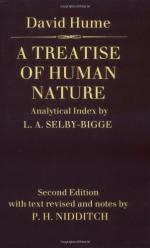
|
David Hume
He writes broadly on matters ranging from epistemology, cognitive science, moral psychology, free will, personal identity, perception, morality, justice, virtue, history, specifically British history, economics, and philosophy of religion. His account of justice is ultimately rooted in sentiment, although the relationship between justice and sentiment is quite complex.
The Man of Common Sense
Hume never explicitly mentions him but he does constantly realize and comment on the fact that his conclusions are at striking variants with what the common sense view of some issue is.
Locke
This is the 17th century British empiricist who influenced Hume but whom Hume went beyond. Hume discusses his views from time to time.
Leibniz
He is one of the great 17th century rationalists many of whose views Hume is trying to oppose.
Descartes
In particular, Hume opposes his views that humans have innate ideas, that we know substantive, non-empirical truths...
(read more Character Descriptions)
|
This section contains 247 words (approx. 1 page at 300 words per page) |

|




